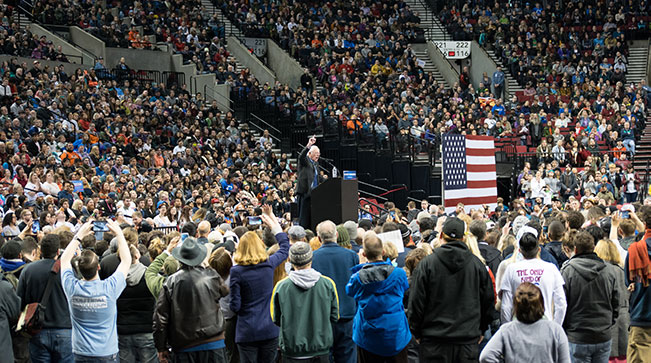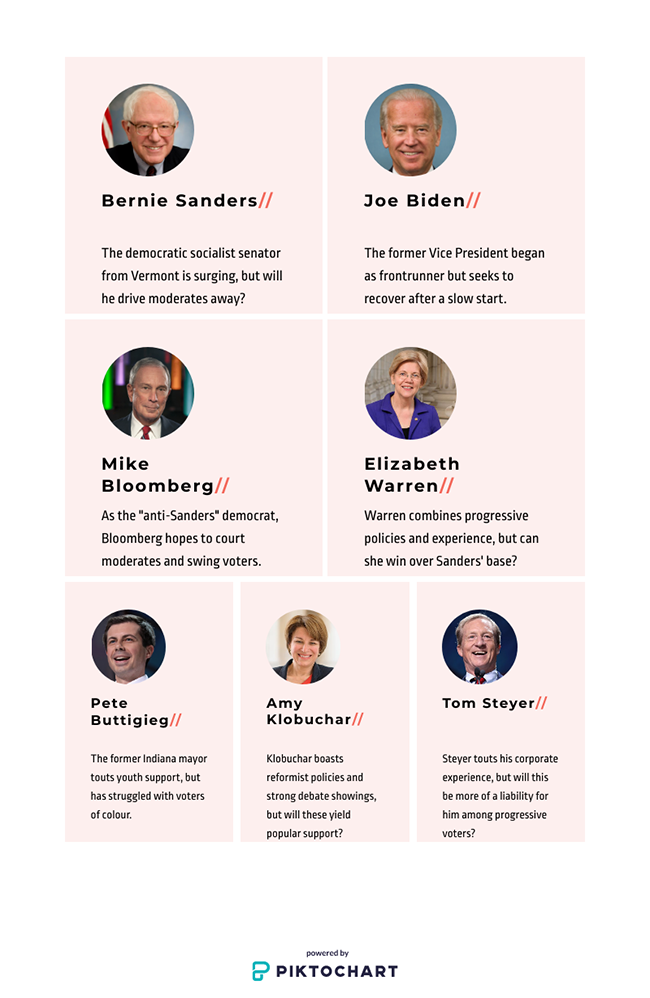Bernie Sanders currently ranks first among Democratic candidates, but he faces hostility from within and outside his party.

cc: Flickr
Jeremy Corbyn’s recent trip to Cardiff to speak to striking workers served as a reminder of the Labour MP’s enduring popularity with certain sections of students and unions.
However, those who voted for the Opposition leader might find it bittersweet, as such popular support failed to propel Corbyn to victory in December’s election.
Meanwhile, the Democratic primaries continue to escalate in hostility and tension as Bernie Sanders, considered by some as Corbyn’s American counterpart, has emerged as the campaign’s frontrunner.
Considering the dual-pronged shock of Brexit and Donald Trump’s election in 2016, many have warned that Corbyn’s defeat signals a similar predictor of American electoral results.
Also problematic for Sanders is the spectre of a coalition against him amongst his opponents in the primary. During the Nevada debate, every candidate except Sanders refused to rule out a plot to block his nomination at the Democratic National Convention if the Vermont Senator failed to achieve a majority of delegates.

This strategy would involve the losing candidates’ pooling their delegates together and allotting them to one candidate, thus boosting that candidate’s combined delegate count past Sanders’.
In effect, Sanders could fail to win the nomination even if he receives the most votes.
Sanders’ critics within his own party cite his often-incendiary polemics against big businesses and the wealthy as a huge liability for his campaign; they argue that such divisiveness will alienate voters in crucial swing states in the general election against Trump.
However, Sanders’ campaign has recently demonstrated an ability to appeal to some of the DNC’s crucial voting demographics. According to Newsweek, as of February he polls higher among black, Asian, Hispanic, and white voters than any other democrat in the race.
Anecdotal evidence also indicates that some who had previously supported other candidates have been swayed by Bernie’s recent success, as well as the media coverage thereof.
For Megan Feringa, media reports about Sanders’ supposed flaws ironically increased her opinion of the democratic socialist.
“I was initially supporting Pete Buttigieg because of his youth and I thought he brought something new to the table,” said Feringa, an American journalism student at Cardiff, “but when the media kept harping on Bernie’s age after his heart procedure I actually started thinking about how much more experience he had compared to mayor Pete.”
“The more I paid attention the more I noticed that many American media outlets portrayed Bernie as an old, out of touch man, but he’s actually advocating for the things that my generation supports,” said Feringa, who recently wrote a Media Watch Column investigating ageism in the American press’s coverage of Sanders.
Feringa’s experience as an American in Wales has also affected her feelings on issues like health care. “It was honestly just really enlightening to just be able to go to the doctor and get medicine, no questions asked,” Feringa said.
If experiences like Feringa’s serve as eye-opening lessons, for Welsh supporters of Corbyn, it simply reinforces principles they’ve always held.
“Of course I’m pro-Bernie,” said Barney Lloyd Wood, a journalism student at Cardiff from Swansea. “Things like national health care, which is apparently a radical position in the States, are just assumed to be human rights elsewhere. It frankly boggles my mind that Bernie’s considered a radical leftist,” said Wood.

As encouraging as Feringa and Wood’s accounts are to anybody hoping for a Sanders victory, it remains to be seen if such enthusiasm is an indicator of voter turnout for him in the general election. Wood, as a Welsh citizen of the United Kingdom, obviously cannot vote in the American election and Feringa said that most of her family and friends are Republicans.
Thus, Bernie’s recent victories have put the Democratic establishment in a difficult position. If they decide that nominating Bernie would increase the likelihood of a Trump victory in November, a brokered convention against him is not off the table. However, a split within the Democratic party would also likely bolster Trump in the general election and reenact Labour’s recent unraveling.
With only three states of fifty reporting primary or caucus results, such speculation arguably seems premature. However, it also proves that Bernie Sanders now officially constitutes the main strategic issue for the party. Both how they deal with him and how swing voters respond to his campaigns will likely decide the direction of the Democratic Party for the forseeable future.
